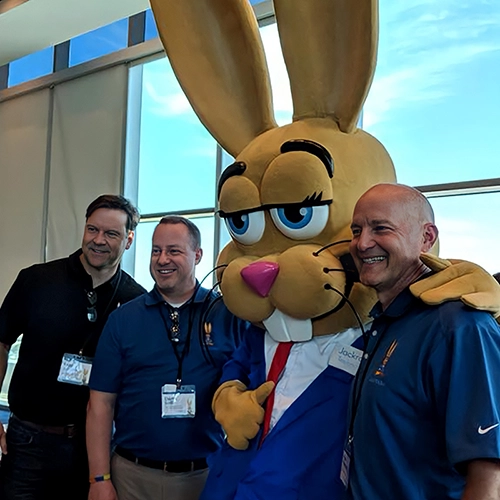Today I missed lunch. I frequently do when I write these articles. Sometimes I end up writing through the night despite the fact that I was tired at 11 p.m. I lose track of time. Why? Because writing these articles and helping others with my advice is something I am passionate about. It feeds my purpose.
In a world where up to 80% of employees are unhappy in their jobs and most companies struggle to articulate their purpose, how do you hire an organization of people who feel so passionate about what they do that they can’t stop doing it?
The answer to this critical question starts with another question: Why?
Recruiting For Purpose
I recently had the privilege of meeting Brian Mohr, Co-Founder and COO of Y Scouts – an executive search firm based in Phoenix, AZ. Brian wanted to share his company’s unique and inspiring mission with me – “purposed based executive search that helps organizations recruit leaders.”
What does “purpose based” recruiting mean? According to Y Scouts, it all starts with asking the question “Why?” Why do you get up in the morning? What keeps you going throughout your day? What leaves you fulfilled at night? In summary, why you do what you do?
While applying the “Why?” psychology to executive recruitment may be new, the idea of asking “Why?” is not. In Simon Sinek’s 2011 book Start with Why: How Great Leaders Inspire Everyone to Take Action, he asserts that if you want to hire people to move your mission and purpose forward, you must hire people who believe what you believe.
In the summer of 1963, a quarter of a million people listened to Dr. Martin Luther King Jr’s “I Have a Dream” speech on the National Mall. According to Sinek, the people who came to this unadvertised event did so not because they believed in Dr. King, but because they rallied to his purpose. They made his purpose their own. “It’s not the products or services that bind a company together,” concludes Sinek. “It’s not size and might that make a company strong, it’s the culture – the strong sense of beliefs and values that everyone, from the CEO to the receptionist, all share.”
To realize Sinek’s culture, both the job candidate and company need to know their purpose and there must be alignment.
Who To Hire
“If today were the last day of your life, what would you do?” is a good question to focus your candidates’ priorities, but it doesn’t help capture their purpose in life. For example, if it were my last day alive, I would want to spend it with my family around me. I would venture to say that many people would want the same. However, a purpose in life is something you do over a period of time – not one day.
Better purpose based questions to ask your candidates are: What are you most interested in and speak most enthusiastically about? And, what do you want others to remember you for?
While the above questions may catch your candidates off guard (never a bad thing!), they will help you – and your candidates – better understand their purpose in life and determine if they align with your company’s purpose.
What Job To Give
No one will argue that clearly defining a job’s required duties is important and necessary, but few have thought further about the essence of what a job asks of an employee – the job’s purpose.
Over my career I have interviewed hundreds of recruiters. I asked them all the same question–”What do you love most about recruiting?” On occasion, but far too infrequently, I hear, “I love placing people in the right jobs.”
Not surprisingly, I have asked the same question of thousands of candidates around the world in almost every imaginable discipline. What do you love most about leading people? Helping them realize their potential. What do you love most about accounting? The business story I can tell with numbers. What do you love most about being a machinist? Creating the perfect piece of metal that works in the final product. What do you love most about customer service? Making people feel special. What do you love most about sales? Helping bring people together with the things that will make their lives better.
For me, these candidates all passed the job purpose test. When you are interviewing, it is important that they do the same for you. Regardless of the role, every job in an organization has a purpose, and this purpose must connect to the larger purpose of your business. If these two components are missing, there will always be a disconnect for your employees, and they will never achieve the deep level of engagement that will have the maximum impact on your business.
Purpose Check
Executives at Southwest Airlines can quickly tell you their organizational purpose: “democratizing the skies.” Likewise, Sam Walton rallied Wal-Martemployees with “If we work together…we’ll give the world an opportunity to see what it’s like to save and have a better life.”
Since 1842 Mott’s has successfully brought “the best of the orchard to families” while Yelp’s promise “to connect people with great local businesses” attracted over 100 million visitors to its website in the first quarter of 2013.
Being able to articulate your organizational purpose is key to recruiting the right employees for your company.
Organizations with a strong sense of purpose talk about it on their websites, showcase it in printed materials, advertisements, and on the walls of their offices, and frequently speak about it at all levels of their organization.
In Roy M. Spence Jr’s recent book, It’s Not What You Sell, It’s What You Stand For: Why Every Extraordinary Business Is Driven by Purpose he writes, “Purpose is a reason for being that goes beyond making money – and it almost always results in making more money than you ever thought possible.”
Spence is the Co-Founder and Chairman of GSD&M, a leading national marketing communications and advertising company. His company pioneered “Purpose-based Branding” helping organizations identify and articulate their purpose beyond making money. Its purpose is “to do whatever it takes to grow our clients’ business so that they can fulfill their Purpose.” Since its establishment in 1971, GSD&M has been instrumental in the growth of some of the world’s most successful brands, including Wal-Mart, Southwest Airlines LUV -0.12%, MasterCard, BMW, John Deere, L.L.Bean, Hallmark, Kohler, PGA TOUR, American Red Cross, AT&T, and the United States Air Force.
The 2013 Deloitte study entitled Culture of Purpose: A Business Imperative, makes this point: “What companies do for clients, people, communities and society are all interconnected. A culture of purpose ensures that management and employees alike see each as a reason to go to work every day.”
Deloitte’s study also concludes that companies that have a strong sense of purpose – as perceived by their employees – also have a history of strong financial performance, high employee engagement, and satisfied customers. In companies where employees said their organization lacked a strong sense of purpose – financial performance, employee engagement, and customer satisfaction were significantly lower.
The One Interview Question You Should Ask
So, how do you hire an organization of people who feel so passionate about what they do that they can’t stop doing it? You simply ask them:
When in your life have you been so passionately focused on an activity that you lost track of time and what were you doing?
For me it was last night as I finished writing this article and discovered that it was 4 a.m.














